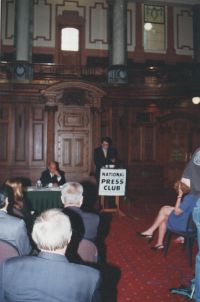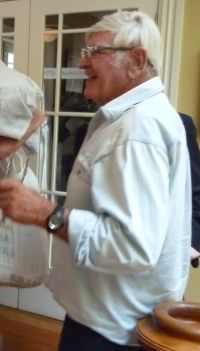Items filtered by date: May 2015
Michele Reverbel Europe’s Leading Scribe Spearheads France’s War on Illiteracy
Michele Reverbel
Europe’s Leading Scribe
Spearheads France’s War on Illiteracy
Michele Reverbel is France’s leading public writer. The modern day scribe enjoys the exalted official status of
Chevalier of Arts and Letters. French society acknowledges that there are many who are illiterate and therefore something must be done about it. The “war against illiteracy” as it is known is officially designated in France as one of the “great national causes.” In the photograph Madame Reverbel meets National Press Club president Peter Isaac. In the background is social commentator Philippe Pitault.
In the photograph Madame Reverbel meets National Press Club president Peter Isaac. In the background is social commentator Philippe Pitault.
Public writers are encouraged to set up their stalls in supermarkets, market places, lofts, factories, prisons, hospitals and fairs in order to practise their craft. Madame Reverbel is the author of a number of books on the subject including You Speak – I Write. Here she reveals that illiteracy is much more widespread than is popularly supposed. Well represented in this category she notes are members of the professional classes.
Under tradition, remuneration for public writers is entirely voluntary and there is no set scale. France’s public writers trace the origin of their craft to ancient Egypt and its scribes. In the mediaeval era they enjoyed a prestige comparable to that of lawyers in more recent times.
Public writers enjoyed immense popularity during the Renaissance when they benefited from the loosening of the monastic grip on scribe services.
It was not to last. The sponsors of the French Revolution saw public writers and their influence as a threat to their cause and the revolutionaries sought to eliminate the craft. Napoleon similarly saw the craft as subversive and thus a threat.
By modern times the craft had all but disappeared. But in 1980 when illiteracy first began to be openly talked about, a handful of public writers were allowed to form their own Academy.
In 2009 the public writer movement enjoyed a major boost when France’s notoriously centralised government shifted policy and started to distribute certain social services. The public writer craft was identified as being part of the voluntary movement capable of taking over publicly funded specialist services, in this case assisting adults who could not write. It was now that public writers federated themselves into a national organisation.
Though public writers exist throughout Europe and especially the Mediterranean region, it is in France that they enjoy their most clear cut role and recognition. Which makes Madame Reverbel Europe’s top scribe.
Club at Barossa Valley To Meet Forgotten Taste-Maker
Club at Barossa Valley
To Meet Forgotten Taste-Maker
Don Hewitson’s triumphs in the field of fine living are fabled in every country except his own. New Zealander Mr Hewitson in London in the 1970s introduced the wine bar as the keystone in the imperial capital of haute cuisine. Until the arrival of Levin-born Mr Hewitson British bars and restaurants peddled cheap burgundies or wine bottled by the chain breweries.
His career in wines began at Wellington Coachman restaurant, mine host, Des Britten. It was one of a trio of pace-setting restaurants there at the cusp of the 1960s/70s that included Le Normandie and the Lotus.
The Wellington sommelier in London now became closely associated with ground-breaking wine bars as Shampers, Cork and Bottle, and the Hanover Square Wine Bar. He retains an interest in these last two. He is credited with if not inventing the phrase popularising Life is too short to drink bad wine. National Press Club operations manager Rex Benson, pictured with the larger-than-life Hewitson, was there at the style maker’s 70 birthday celebration in Australia.
National Press Club operations manager Rex Benson, pictured with the larger-than-life Hewitson, was there at the style maker’s 70 birthday celebration in Australia.
Why is this prophet of the profitable London wine bar celebrated everywhere save his own land? And at a time when entrepreneurs especially those in international cuisine are shouldering out rugger players in the national Pantheon?
With homes in several of the world’s most sought after destinations the former music reviewer on Victoria University’s student publication Salient remains one of New Zealand’s unclaimed assets.
Might not the Horowhenua lad’s next birthday be celebrated not in the Barossa Valley, but perhaps in Marlborough or Martinborough?
Death of Carrick Lewis
Death of Carrick Lewis
Carrick Lewis who has died after a long illness was a determined and contributing member of the National Press Club.
He was one of a number of high-level public sector administrators who joined the club via the University Club and then the Civil Service Club as these clubs reluctantly closed their doors for the last time.
Of measured and considerate manner he was a studious listener who enjoyed being drawn into discussions, be they practical, abstract, or doctrinal. He attended all annual general meetings of the National Press Club, and took the proceedings with notable seriousness and attention to detail.
He was for many years involved with the United Nations Association being national president in the early 1990s. He was a former president of the National Library Society, and was prominent mover behind Grey Power. He was much to the fore in cultivating closer relations between the USSR- Russia and New Zealand, and at a time when there was much hostility toward the Soviets.
His mild and accommodating manner disguised though his fierce determination to promote the interests of what he saw as underdogs. This also extended to individuals and entities of money and power if he believed that they were being treated as underdogs.
He was born in 1937. He is survived by his wife Norina.
Remembering Thea Muldoon
An Interview with National Press Club President Peter Isaac
Dame Thea Muldoon Personified an Era.
She Gave Shortest New Zealand Speech Ever
Central Districts Journalists Enjoy 20th Field Day
The 20th annual gathering of Central Districts/ Wellington region journalists this year also served as a milestone for perpetual host New Zealand Farmer editor Jon Morgan's own half century in harness.
He signed on under the old cadet apprenticeship scheme in his teens and soon began specialising in rural and agribusiness reporting which has remained his focus ever since. In recent years he has found himself shifting from the press bench to the judges rostrum, adjudicating on exhibits at agricultural shows and field days.
The event also gives his guest-colleagues an insight into their hosts' own pastoral and horticutural skills because the venue is the Morgan's own property in the Horowhenua - Kapiti district.
 Post prandial. Evening Post's Penny Harding Gary Connor
Post prandial. Evening Post's Penny Harding Gary Connor
West Deluding Itself Over Russia Claims NATO Chief

Russia will adhere to its traditions regardless of what the West wants it do, thinks it should do, or believes it should do cautioned Major General Peter Williams talking to the National Press Club at the Associated Audio Bose auditorium.
The Russian mind-set and thus approach rests on fear of iinternal fragmentation which in turn pivots on the threat of external intervention, especially full scale invasion. Such fears were justified noted General Williams recalling the British interventionism after World War 1. This was followed by the determination after World War 2 of the West to disrupt the USSR via the Cold War.
This type of damaging intervention continues to this day, he observed, and is characterised for example by the United Kingdom taking in from Russia hundreds of billions of US dollars equivalent which amounted to “dirty money,” declared General Williams.
General Williams himself was a Cold War warrior having served with BRIXMIS, the British cross-mission into Soviet held East Germany.
After the collapse of the USSR he went on to lead the NATO Mission to the new Russian Federation.
The Coldstream Guards officer identified the failure of the West to understand the Russia concept of power as central to what he described as the syndrome in which there was the belief that “because they look like us – they must also think like us.”
In the event Russians were most at home with their tradition of centralised monolithic power just because experience had taught them that such unbridled power was the best way to deal with these constant threats of invasion, foreign interventionism, internal fragmentation, and economic collapse.
There was no such thing in the Russian makeup as the notion of the steel fist in the velvet glove. There was no such concept as the Western one about the “abuse of power”.
“In Russia, if you have power. Then you must use it. If you do not use it, then the power that you possess will simply be taken away from you.”
Because of this, Russia was determined to bring back into Mother Russia, what it knew as its “near abroad,” the newly created republics.
In pursuit of this national objective Russia, under its leader Vladimir Putin, would continue to exhibit singularity of purpose by, for example, “reaching out to kill its enemies, regardless of where they are.”
Russia, emphasised General Williams, was not going to change its ways on the whims of the West. Its overarching objective remains to restore its Tsarist “former glories.”
An aspect of Russian life today that constantly bamboozled Western journalists and other observers and analysts declared General Williams was that surrounding the lifestyle of Vladimir Putin himself.
His association with gymnasts and other such contemporary figures in the sports sphere was interpreted in the West as an indication of modernism.
In the event and within Russia such behaviour was regarded as a tough-guy lifestyle, and thus to be respected – and feared.
 Committee member Digby Paape with Major General Peter Williams at the National Press Club meeting at the Associated Audio Bose Auditorium in Wellington
Committee member Digby Paape with Major General Peter Williams at the National Press Club meeting at the Associated Audio Bose Auditorium in Wellington
Continue here to view more photographs
National Press Club Stalwart Addresses Poland Parliament
National Press
Club Stalwart
Addresses Poland
Parliament
Krystina Tomaszyk (pictured) has addressed the Polish Parliament on the topic of the post World War 2 diaspora of the nation’s peoples. She addressed the Senate, the Upper House, on the divergence of Polish peoples in different parts ofthe world.  Mrs Tomaszyk spoke of the variables affecting the groups in terms of geographical location and the differing attitudes of the communities in which they now found themselves.
Mrs Tomaszyk spoke of the variables affecting the groups in terms of geographical location and the differing attitudes of the communities in which they now found themselves.
During World War 2 she was among those forcibly deported from Poland by the Soviets to Siberia. Then via Isfahan, and through the influence of the Polish legation in Wellington, eventually arriving in New Zealand.
These experiences and what followed are related in Mrs Tomaszyk’s autobiography, Essence. In her adult career in New Zealand Mrs Tomaszyk continued to cross boundaries becoming a pioneer marriage guidance counsellor and in other areas of community health. Along the way she became a publisher, and it was in this capacity that she joined the National Press Club.
In her address to Poland’s legislature she warned that neither Poland itself nor its dispersed peoples could be complacent about their future. Past threats could recur she warned, and become present dangers.
She has been prominent in a number of internationalist associations, notably that of United Nations. She married in 1952 the late Czeslaw Tomaszyk a hero of the Polish resistance movement.

















